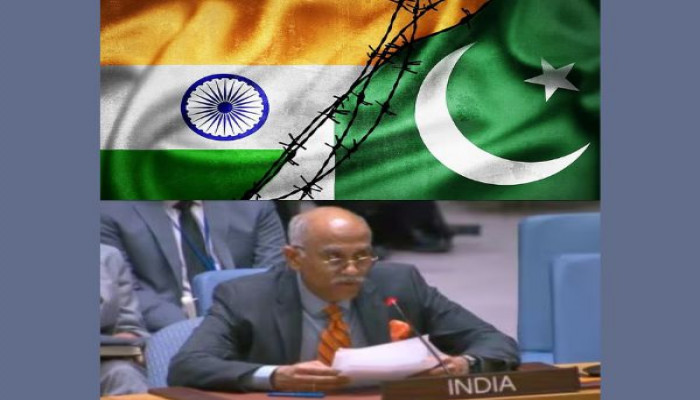India slams Pakistan at UNSC over terror links, says states must pay ‘serious cost’ for cross-border attacks
- In Reports
- 06:07 PM, Jul 23, 2025
- Myind Staff
At the United Nations Security Council meeting chaired by Pakistan, India stated that countries supporting cross-border terrorism must face a “serious cost”, while referring to Pakistan as a “serial borrower” marked by “fanaticism”.
“As we debate promoting international peace and security, it is essential to recognise that there are some fundamental principles which need to be universally respected. One of them is zero tolerance for terrorism,” said India’s Permanent Representative to the U.N., Ambassador Parvathaneni Harish.
Harish made the remarks on Tuesday, July 22, 2025, at the U.N. Security Council’s high-level open debate on ‘Promoting International Peace and Security through Multilateralism and Peaceful Settlement of Disputes’, which was held under Pakistan’s presidency of the 15-member Council for the month.
Pakistan’s Deputy Prime Minister and Foreign Minister Ishaq Dar led the session, which also included remarks from U.N. Secretary-General Antonio Guterres.
Speaking on behalf of his country, Dar raised the issue of Jammu and Kashmir along with the Indus Waters Treaty.
India responded to the Pahalgam attack by putting the 1960 Indus Waters Treaty on hold until Pakistan clearly and permanently ends its support for cross-border terrorism. Türkiye also referred to Jammu and Kashmir during its statement in the discussion.
Replying firmly to Dar’s remarks, Harish said the Indian sub-continent presents a clear difference in development paths. “On the one hand, there is India, which is a mature democracy, a surging economy and a pluralistic and inclusive society. At the other extreme is Pakistan, steeped in fanaticism and terrorism and a serial borrower from the International Monetary Fund (IMF).”
In May this year, the IMF approved a disbursement of about one billion dollars to Pakistan under the Extended Fund Facility, which brought the total amount received under the programme to around 2.1 billion dollars.
During the Security Council meeting, Harish brought up the Pahalgam terror attack, for which The Resistance Front, linked to the Pakistan-based group Lashkar-e-Taiba, had claimed responsibility.
“There should be a serious cost to states who violate the spirit of good neighbourliness and international relations by fomenting cross-border terrorism,” Harish stated.
“It ill behoves a member of the Council to offer homilies while indulging in practices that are unacceptable to the international community,” he added.
He said that after the brutal terror strike in Pahalgam, Jammu and Kashmir, on April 22, which led to the deaths of 26 tourists, and in line with the UNSC statement issued on April 25, India launched Operation Sindoor targeting terror camps located in Pakistan and Pakistan-occupied Kashmir.
In that UNSC statement, Council members had stressed the importance of holding the perpetrators, organisers, funders and sponsors of the terror attack accountable and ensuring they are brought to justice.
Harish said India’s response was specific, limited, and did not aim to escalate the situation. “On achieving its primary objectives, a cessation of military activities was directly concluded at the request of Pakistan,” he said.
Earlier, Acting U.S. Representative Ambassador Dorothy Shea said at the meeting that over the past three months, the U.S. had helped reduce tensions between Israel and Iran, the Democratic Republic of Congo and Rwanda, and also between India and Pakistan.
“The United States, under President Trump’s leadership, played an important role in encouraging the parties to reach these resolutions, which we applaud and support,” Shea said.
Harish noted that the nature of conflict has changed in recent years. There has been a rise in non-state actors, often backed by states, who receive cross-border funding, weapons, training, and ideological support spread through modern digital and communication tools.
He said that Chapter VI of the U.N. Charter clearly states that it is the responsibility of the parties in a dispute to first seek a peaceful resolution by means of their own choosing.
“National ownership and consent of parties are central to any efforts to achieve peaceful resolution of conflicts,” he said.
He also said that there cannot be a single fixed method for resolving disputes. “The changing circumstances and context also need to be taken into account while considering any such efforts.”
Harish pointed out that there are rising doubts about the multilateral system, especially the United Nations, and serious concerns about how representative the Security Council is. “In this context, India is proud to have facilitated the inclusion of the African Union in the G-20 platform during its Presidency. The continuing U.N. Security Council impasse also shows the increasing challenges to the efficiency and effectiveness of the U.N. Security Council,” he said.
Pakistan is currently serving as a non-permanent member of the 15-member Security Council for the 2025-26 term.







Comments